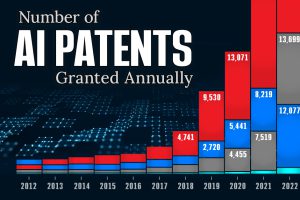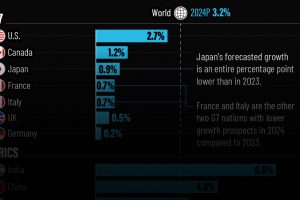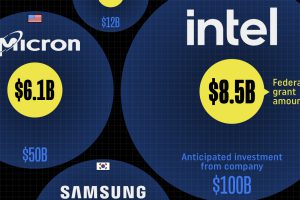The World’s 200+ Unicorns, in One Giant Map
Today’s infographic comes to us from cost information site HowMuch.net, and it shows the hundreds of unicorns around the world. The special “unicorn” moniker, of course, is reserved for privately-held startups that reach valuations of a billion dollars or more.
In this map, the startups are plotted plotted based on their country of origin, and not their physical geographic location (such as a specific city or state). Further, companies are organized also based on color, which represents the spectrum of sectors that these startups span across.
The Most Valuable Startups
Today, there are 214 unicorns worth a collective $744 billion – but that dollar value is distributed very unequally.
According to research firm CB Insights, the top 10 unicorns alone are worth $303.3 billion (41%), while the “bottom” 204 make up the remaining $440.7 billion (59%) of the pool.
| Rank | Unicorn | Country | Valuation ($B) | % of Unicorn Total |
|---|---|---|---|---|
| #1 | Uber | USA | $68 | 9.1% |
| #2 | Didi Chuxing | China | $50 | 6.7% |
| #3 | Xiaomi | China | $46 | 6.2% |
| #4 | Airbnb | USA | $29.3 | 3.9% |
| #5 | SpaceX | USA | $21.2 | 2.8% |
| #6 | Palantir Technologies | USA | $20 | 2.7% |
| #7 | WeWork | USA | $20 | 2.7% |
| #8 | Lu.com | China | $18.5 | 2.5% |
| #9 | China Internet Plus Holding | China | $18 | 2.4% |
| #10 | USA | $12.3 | 1.7% | |
| Top 10 Total | $303.3 | 40.8% | ||
| All Other 204 Unicorns | $440.70 | 59.2% |
Known Unknowns
You’re probably very familiar with companies like Uber and Airbnb, but almost half of the companies on the Top 10 list are from China.
What do these companies do that make them more valuable than big names like Dropbox, Stripe, or Spotify?
Didi Chuxing – $50 billion
Didi Chuxing is China’s most popular ride-sharing service, providing transportation to 400 million users across over 400 cities in China. In 2016, they even acquired Uber’s China division, winning an epic “battle” between these two transportation startup giants.
Xiaomi – $46 billion
Xiaomi designs and sells consumer electronics products, and is currently the world’s fifth-largest smartphone maker. (We talked about how Xiaomi and other companies in China are shaking up global the smartphone market here.)
Lu.com – $18.5 billion
Lufax is the second-largest P2P lender in China, and is partially owned by Ping An Insurance Group. The company plans to aggressively target other areas of fintech, including wealth, credit, payments, insurance, and regulatory tech.
China Internet Plus Holding – $18 billion
Formed by a merger in 2015, and now doing business as Meituan-Dianping, this company has the world’s largest online and on-demand delivery platform, recently reaching up to 10 million daily orders and deliveries. Think of it as a combination Groupon and Yelp.





